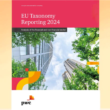Airbus has announced a strategic investment in LanzaJet, a sustainable fuels technology company, to bolster the global development of sustainable aviation fuels (SAF). This investment aims to enhance LanzaJet’s Alcohol-to-Jet (ATJ) pathway, enabling the company to expand its capacity to scale its proprietary Ethanol to Sustainable Aviation Fuel (SAF) process technology.
LanzaJet’s technology utilises low-carbon ethanol to create SAF, which reduces greenhouse gas emissions by more than 70% compared to fossil fuels on a lifecycle basis. This SAF can further decrease emissions through various carbon reduction technologies and is compatible with existing aircraft engines and infrastructure.
Jimmy Samartzis, Chief Executive Officer of LanzaJet, highlighted the strategic importance of the investment and said, “LanzaJet intentionally developed a diverse portfolio of strategic investors consisting of leading, global companies to ensure we have the ecosystem to scale the SAF industry. This important investment from Airbus supports the growth of our company, enabling LanzaJet to scale the production and deployment of SAF to continue working towards meeting aviation’s decarbonisation goals and developing a more sustainable industry.”
LanzaJet is currently initiating the world’s first commercial-scale production of ethanol-to-SAF at its Freedom Pines Fuels facility in the United States. The plant will produce SAF and renewable diesel from low-carbon and sustainable ethanol, serving as a blueprint for scaling SAF production globally, with projects across 25 countries and 5 continents.
Julie Kitcher, Chief Sustainability Officer at Airbus, emphasised the significance of this partnership and said, “Sustainable aviation fuels are one of the most important levers available to decarbonise aviation, but their production is still limited. This important partnership with LanzaJet underlines the importance of new technologies and cross-sector collaboration to achieve net-zero CO2 emissions by 2050.”






















